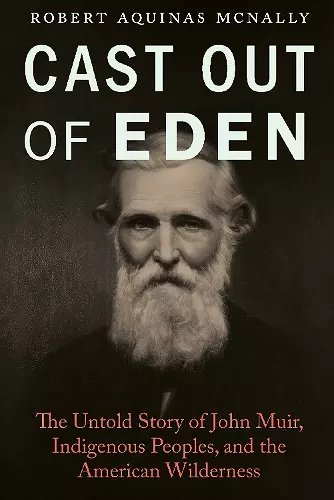Cast Out of Eden
The Untold Story of John Muir, Indigenous Peoples, and the American Wilderness
Format:Hardback
Publisher:University of Nebraska Press
Published:1st May '24
Currently unavailable, and unfortunately no date known when it will be back

John Muir is widely and rightly lauded as the nature mystic who added wilderness to the United States’ vision of itself, largely through the system of national parks and wild areas his writings and public advocacy helped create. That vision, however, came at a cost: the conquest and dispossession of the tribal peoples who had inhabited and managed those same lands, in many cases for millennia. Muir argued for the preservation of wild sanctuaries that would offer spiritual enlightenment to the conquerors, not to the conquered Indigenous peoples who had once lived there. “Somehow,” he wrote, “they seemed to have no right place in the landscape.”
Cast Out of Eden tells this neglected part of Muir’s story—from Lowland Scotland and the Wisconsin frontier to the Sierra Nevada’s granite heights and Alaska’s glacial fjords—and his take on the tribal nations he encountered and embrace of an ethos that forced those tribes from their homelands. Although Muir questioned and worked against Euro-Americans’ distrust of wild spaces and deep-seated desire to tame and exploit them, his view excluded Native Americans as fallen peoples who stained the wilderness’s pristine sanctity. Fortunately, in a transformation that a resurrected and updated Muir might approve, this long-standing injustice is beginning to be undone, as Indigenous nations and the federal government work together to ensure that quintessentially American lands from Bears Ears to Yosemite serve all Americans equally.
“A convincing, corrective portrait of a revered but flawed man, and of a movement’s original sins. It ends on a note of modest hope, as McNally jumps to the present to detail how Native Americans are claiming their rightful places in the nation’s national parks.”—Peter Fish, San Francisco Chronicle Datebook
"A revealing biography, Cast Out of Eden details the hypocrisy, cruelty, and astonishing achievements of John Muir."—Foreword Reviews
"This is a well-written exploration of John Muir's life and legacy."—James H. McDonald, New York Journal of Books
“To most Americans, John Muir is a folk hero, a writer and thinker who inspired the nation’s wilderness preservation movement. Robert McNally’s powerful new biography offers a darker vision, situating Muir’s life and work within America’s violent campaigns of Indigenous land dispossession and genocide. Cast Out of Eden is a vivid and absorbing read, one that will challenge everything you think you know about one of America’s most famous environmentalists.”—Megan Kate Nelson, author of The Three-Cornered War, finalist for the Pulitzer Prize in History
“Robert Aquinas McNally takes John Muir off his pedestal and paints him as a man of his times, blinded by his belief in white supremacy and his faith in manifest destiny. In doing so, McNally provides a helpful, needed context for our own era and its conflicts.”—Margaret Verble (Cherokee Nation), author of Maud’s Line, finalist for the Pulitzer Prize in Fiction
“Robert Aquinas McNally lays out not only John Muir’s public love affair with the wild spaces that became national parks but also his deep-seated disdain for the American Indians whose homelands those parks expropriated. A page-turning, eye-opening read that delves unflinchingly into the dark side of preservation politics, then turns toward a future where wild spaces work their natural magic for all—not just some—Americans, including the tribes.”—Susan Devan Harness (Confederated Salish and Kootenai Tribes), author of the award-winning Bitterroot: A Salish Memoir of Transracial Adoption
“Robert Aquinas McNally brings John Muir and his world to life, warts and all, with an eye for gripping historical details. An urgent story for our troubled times, this is narrative nonfiction at its best!”—Boyd Cothran, author of The Edwin Fox: How an Ordinary Sailing Ship Connected the World in the Age of Globalization, 1850–1914
“A thought-provoking masterpiece. Following the life and achievements of John Muir, ‘Father of the National Parks,’ McNally masterfully shows how one of America’s greatest achievements—the preservation of our wildest places—is indelibly tied to one of our most abject failures—the treatment of the Native Americans who lived there.”—Matthew Kerns, Spur and Western Heritage Award–winning author of Texas Jack: America’s First Cowboy Star
“Robert McNally has added to John Muir’s legacy in a way that will hook both conservationists and those with little interest in wilderness. At a time when the natural world has once again become the protagonist of our story, McNally breaks down the complicated and conflicted relationship with nature to show how our long-standing attitudes toward wild spaces grew from the limited perspective of an elite few. This is the story not of a single man but of a time, place, and culture that created a public figure who has hugely influenced how we interact today with the natural world—for good and ill.”—Katya Cengel, author of From Chernobyl with Love
“Robert Aquinas McNally throws back the curtain on John Muir and our deeply held beliefs about how the American wilderness came to be. A dogged researcher, McNally offers sometimes unsettling facts but steeps such accounts in a deep reverence for storytelling. As hard-hitting as it is lyrical, the profound truth at the heart of this book invites all of us to rethink what we’ve been told about Indigenous peoples.”—Melissa Fraterrigo, author of Glory Days
ISBN: 9781496227263
Dimensions: unknown
Weight: unknown
328 pages